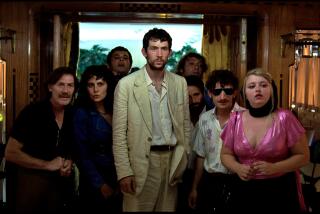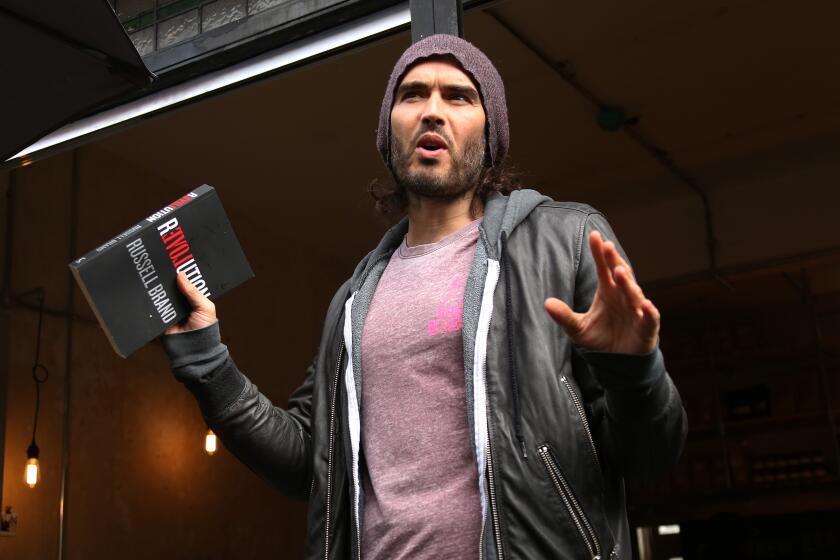A Centennial Tribute to French Funnyman Pagnol
The UCLA Film Archive’s “Toujours Provence: Marcel Pagnol at 100,” a centennial tribute to the birth of France’s timeless maestro of the human comedy, begins Saturday at 7:30 p.m. in Melnitz Theater with “Marius” (1931), the first part of Pagnol’s beloved “Fanny” trilogy.
Directed with a quality of artlessness by Alexander Korda from Pagnol’s script of his hit play, it embraces its people with extraordinary warmth and compassion, and they are portrayed in superlative fashion by an ensemble cast. The setting is the Marseilles waterfront, where the middle-aged, widowed Cesar (Raimu) runs a bar with the help of his son Marius (Pierre Fresnay). In front of the small establishment, the plump fishmonger Norine (Alida Rouffe) sets up her stall every day, aided by her pretty 18-year-old daughter Fanny (Orane Demazis).
When the recently widowed shopkeeper Panisse (Charpin) starts sizing up Fanny as a prospective wife, she and Marius (and their parents) begin to realize that the young people, who grew up together, are really in love with each other--yet Marius is finding the lure of the sea and distant lands increasingly irresistible. Perhaps what’s most striking about this film is that it has so many people--foolish, vain or self-deceiving as they may be--so capable of caring so much for each other.
*
In “The Well-Digger’s Daughter” (1941), screening Sunday night, the long-faced Fernandel joins Raimu and Charpin to complete the trio of France’s great single-name comic actors. Like Eric Rohmer, Pagnol is able to get away with lots of talk because of his bemused grip on human nature. Pagnol demands that we slow down and listen--and then makes it worth the effort.
The portly, deep-voiced Raimu plays an honest peasant, a widowed well-digger whose emotions and sense of propriety conflict with each other when he learns that his beautiful daughter (Josette Day), eldest of his six daughters, has become pregnant by a dashing aviator (Georges Grey), who has received his orders to head for the African front. (The time is the early part of World War II, and this film was the first made in France’s Unoccupied Zone to be permitted nationwide distribution.)
The first of the film’s many major scenes occurs when Raimu and Day have it out with Grey’s parents, ultra-bourgeois shopkeepers (Charpin, Line Noro) who are quick to label their visitors as blackmailers. Yet Pagnol is as patient as he is wise, demonstrating a profound faith in the ability of people to change their hearts. For Fernandel, playing Raimu’s good-hearted, gentle, often-comical assistant, as well as Raimu and Charpin, Pagnol has provided incredibly rich and varied roles.
For full schedule: (310) 206-FILM.
*
Life in Russia: “Revealing Russia: Five Films by Marina Goldovskaya” concludes this weekend at the Sunset 5 with “The Shattered Mirror” (1993) and “Lucky to Be Born in Russia” (1994), which will screen Saturday and Sunday at 11 a.m.
The 58-minute companion documentaries form a record of how Russians are coping with day-to-day life in the wake of the chaos of the fall of the Soviet Union.
Goldovskaya goes into the thick of volatile street demonstrations, but the heart of her films unfolds over the kitchen stoves and dining room tables of her friends, who are professionals, intellectuals and artists; their ability to articulate their emotions and opinions gives the documentaries a sense of optimism, whereas a number of the people in the street are more desperate, simplistic, ignorant and blatantly anti-Semitic.
You can only hope that the kind of people Goldovskaya knows will prevail. While being interviewed for TV, Goldovskaya touches upon the key to why her films have such warmth, vitality and immediacy: “You have to be tuned into life.”
Information: (213) 848-3500.
More to Read
Only good movies
Get the Indie Focus newsletter, Mark Olsen's weekly guide to the world of cinema.
You may occasionally receive promotional content from the Los Angeles Times.






